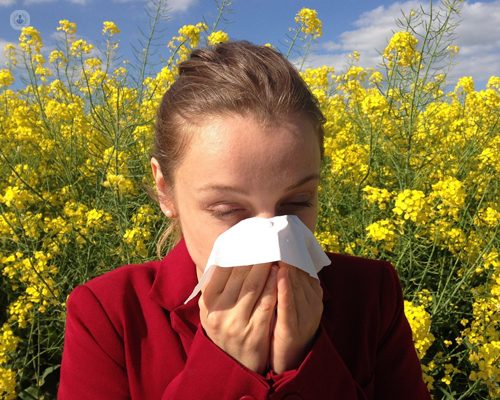Managing allergies: Understanding triggers and effective treatment options
Written in association with:Allergies affect millions of people worldwide and can range from mild discomfort to severe, life-threatening reactions. Understanding the triggers behind allergic reactions and exploring effective treatment options are key to managing allergies successfully. Leading general practitioner Dr Ryan Murray provides a detailed look at this important topic.

Common allergy triggers
Allergic reactions occur when the immune system overreacts to a substance that is typically harmless to most people. These substances, known as allergens, can be found in various environments, including:
- Pollen: A major trigger for seasonal allergies, pollen is released by trees, grasses, and weeds.
- Dust mites: Tiny organisms that thrive in household dust can cause year-round allergic symptoms.
- Animal dander: Proteins found in the skin, saliva, and urine of pets can trigger allergic reactions, particularly in those sensitive to cats or dogs.
- Food allergens: Common food allergens include nuts, shellfish, eggs, and dairy, and they can cause reactions ranging from mild itching to severe anaphylaxis.
- Insect stings: Bee, wasp, and other insect stings can provoke allergic responses, sometimes leading to life-threatening reactions.
- Mould: Fungi spores found indoors and outdoors can cause respiratory issues for those with mould allergies.
What are the symptoms of allergies?
Allergic reactions can manifest in various ways depending on the individual and the type of allergen. Symptoms may include:
- Sneezing
- Runny or blocked nose
- Itchy, watery eyes
- Coughing or wheezing
- Skin rashes or hives
- Swelling of the face, lips, or throat (angioedema)
- Digestive issues, such as nausea or vomiting (in cases of food allergies)
In severe cases, anaphylaxis, a life-threatening reaction, can occur, causing difficulty breathing, a rapid pulse, and loss of consciousness. This requires immediate medical attention.
What are effective allergy treatments?
Managing allergies often involves a combination of avoiding triggers and using medications to control symptoms. Some effective treatments include:
- Antihistamines: These medications help reduce or block histamine, a chemical released during an allergic reaction, and can alleviate symptoms such as sneezing, itching, and runny nose.
- Decongestants: Available in pill or nasal spray form, decongestants relieve nasal congestion caused by allergies.
- Corticosteroids: These anti-inflammatory medications, available in nasal sprays or inhalers, help reduce swelling and inflammation in the airways.
- Immunotherapy: Also known as allergy shots, immunotherapy involves regular exposure to small amounts of an allergen to help the body build tolerance over time, reducing the severity of reactions.
- Epinephrine: For individuals at risk of anaphylaxis, carrying an epinephrine auto-injector is essential. Epinephrine rapidly reverses the symptoms of a severe allergic reaction and can be life-saving when administered promptly.
Preventing and managing allergies
To manage allergies effectively, it is important to identify specific triggers and take steps to minimise exposure. Some preventive measures include:
- Keeping windows closed during high pollen seasons
- Using dust mite-proof covers on mattresses and pillows
- Regularly cleaning and vacuuming the home to reduce dust and pet dander
- Avoiding foods that cause allergic reactions
- Wearing protective clothing when working outdoors to avoid insect stings
For those with severe allergies, especially food or insect-related, it’s crucial to have a personalised action plan, including carrying epinephrine and ensuring that family members, friends, or colleagues know how to use it in an emergency.
Allergies can be a lifelong condition, but with proper management, individuals can minimise their symptoms and enjoy a better quality of life.
Do you experience allergies and are looking for expert treatment? Arrange a consultation with Dr Murray via his Top Doctors profile.


